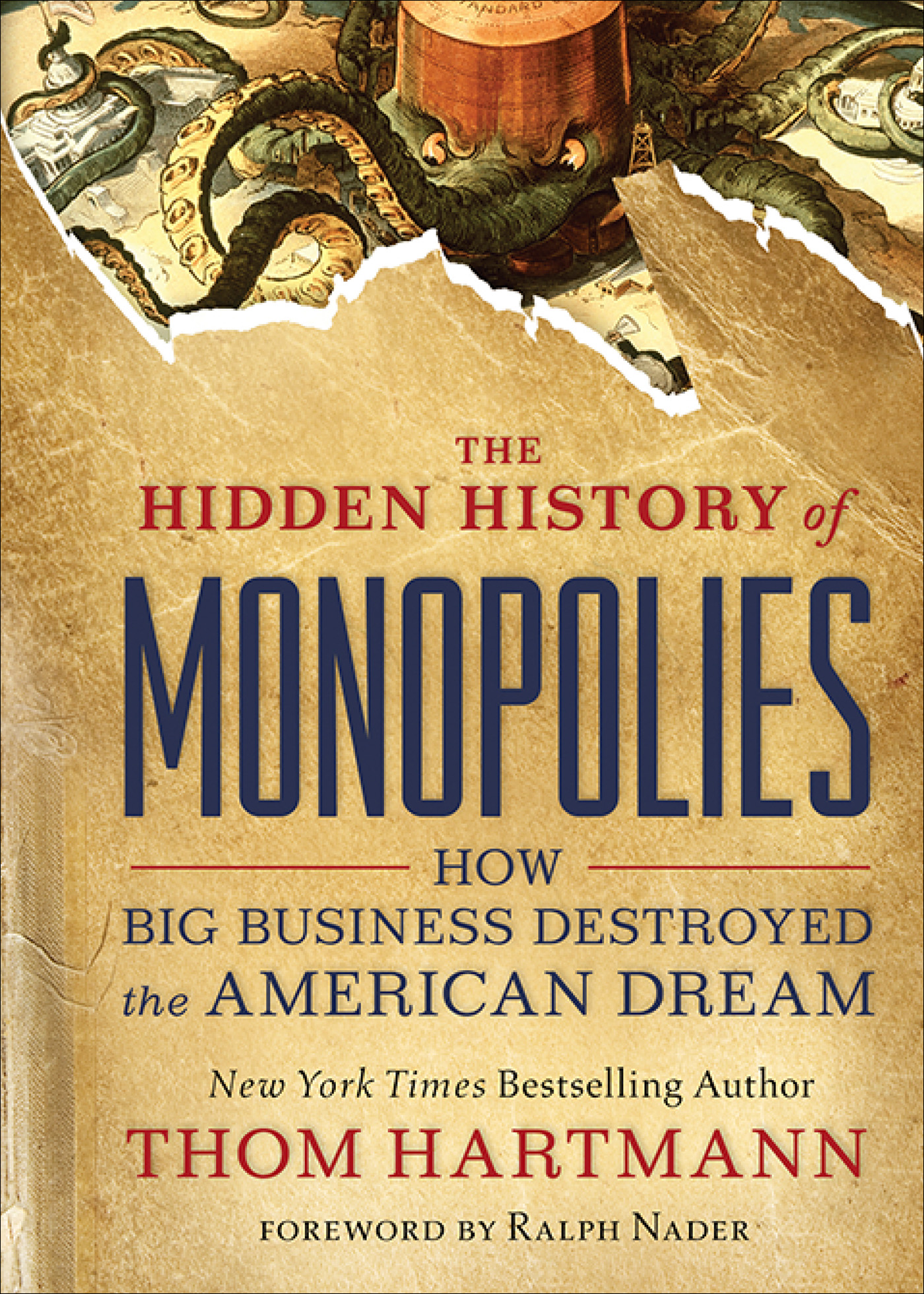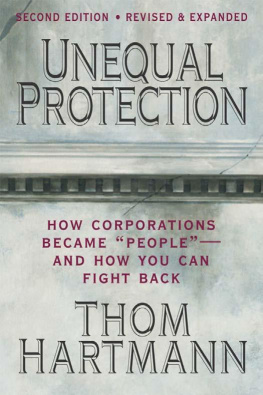Thom Hartmann - The Hidden History of Monopolies
Here you can read online Thom Hartmann - The Hidden History of Monopolies full text of the book (entire story) in english for free. Download pdf and epub, get meaning, cover and reviews about this ebook. publisher: Berrett-Koehler Publishers, genre: Politics. Description of the work, (preface) as well as reviews are available. Best literature library LitArk.com created for fans of good reading and offers a wide selection of genres:
Romance novel
Science fiction
Adventure
Detective
Science
History
Home and family
Prose
Art
Politics
Computer
Non-fiction
Religion
Business
Children
Humor
Choose a favorite category and find really read worthwhile books. Enjoy immersion in the world of imagination, feel the emotions of the characters or learn something new for yourself, make an fascinating discovery.

- Book:The Hidden History of Monopolies
- Author:
- Publisher:Berrett-Koehler Publishers
- Genre:
- Rating:3 / 5
- Favourites:Add to favourites
- Your mark:
- 60
- 1
- 2
- 3
- 4
- 5
The Hidden History of Monopolies: summary, description and annotation
We offer to read an annotation, description, summary or preface (depends on what the author of the book "The Hidden History of Monopolies" wrote himself). If you haven't found the necessary information about the book — write in the comments, we will try to find it.
The Hidden History of Monopolies — read online for free the complete book (whole text) full work
Below is the text of the book, divided by pages. System saving the place of the last page read, allows you to conveniently read the book "The Hidden History of Monopolies" online for free, without having to search again every time where you left off. Put a bookmark, and you can go to the page where you finished reading at any time.
Font size:
Interval:
Bookmark:

The Hidden History of Monopolies

The Hidden History of Monopolies
Copyright 2020 by Thom Hartmann
All rights reserved. No part of this publication may be reproduced, distributed, or transmitted in any form or by any means, including photocopying, recording, or other electronic or mechanical methods, without the prior written permission of the publisher, except in the case of brief quotations embodied in critical reviews and certain other noncommercial uses permitted by copyright law. For permission requests, write to the publisher, addressed Attention: Permissions Coordinator, at the address below.
| Berrett-Koehler Publishers, Inc. |
Ordering information for print editions
Quantity sales. Special discounts are available on quantity purchases by corporations, associations, and others. For details, contact the Special Sales Department at the Berrett-Koehler address above.
Individual sales. Berrett-Koehler publications are available through most bookstores. They can also be ordered directly from Berrett-Koehler: Tel: (800) 929-2929; Fax: (802) 864-7626; www.bkconnection.com
Orders for college textbook/course adoption use. Please contact Berrett-Koehler: Tel: (800) 929-2929; Fax: (802) 864-7626.
Distributed to the U.S. trade and internationally by Penguin Random House Publisher Services.
Berrett-Koehler and the BK logo are registered trademarks of Berrett-Koehler Publishers, Inc.
First Edition
Paperback print edition ISBN 978-1-5230-8773-0
PDF e-book ISBN 978-1-5230-8774-7
IDPF e-book ISBN 978-1-5230-8775-4
Digital audio ISBN 978-1-5230-8776-1
2020-1
Book production: Linda Jupiter Productions; Cover design: Wes Youssi, M.80 Design; Edit: Elissa Rabellino; Proofread: Mary Kanable; Index: Paula C. Durbin-Westby
The American Beauty rose can be produced in the splendor and fragrance which bring cheer to its beholder only by sacrificing the early buds which grow up around it. This is not an evil tendency in business. It is merely the working-out of a law of nature and a law of God.
John D. Rockefeller
This is the most important, dynamic booksmall as it ison the cancers of monopoly by giant corporations written in our generation. I have read many books on monopolistic practices and have written on this subject. None had the potential to reach the moral imagination and indignation of the American people, where they live, work, and raise their families, like Hartmanns engrossing volume. None, for sure, had the potential to reach so many members of Congress who are finally awakening to the long-overdue accounting of monopolys many costseconomic and beyond economicand the need to strengthen the old antitrust laws and enact the new ones that reach all the way to Silicon Valley.
Because he has for many years had a daily three-hour national radio talk show, Hartmann knows how to communicate importance to everyone, regardless of their self-described political persuasions. Because he is by far the most erudite longtime national radio talk show host, he has had an uncanny sense of retrieving critical segments of American history, ignored by historians, regarding the suspicion and caution our forebears had about this artificial entity called the large corporation as it became more immune and more privileged than real human beings.
It was Hartmann, a prolific published historian, who dug out the records surrounding the notorious 1886 Supreme Court case Santa Clara County v. Southern Pacific Railroad Co., where the scribeformerly a railroad mandistorted the decision in his case summary to say that all corporations are persons for purposes of the 14th Amendment to our Constitution. It was Hartmann who rescued from history the heroic efforts by our forebears to stop the ravaging structures of corporations, enabled by their corporate lawyers who wrote the very corporate laws allowing their clients to become lawlessly lawful before the lobbyists rammed them through state legislatures and Congress.
From the time in the 19th century when state legislatures held these corporations under charters that required renewal and even embraced a corporate death penalty, which Hartmann describes, giant corporatism has steadily imposed its corporate supremacyprofit at any costover workers; consumers; communities; small taxpayers; public budgets; and, most crucially, the local, state, and national governments of our country. Relentlessly, there looms an ever-deeper corporate statewhat President Franklin Delano Roosevelt called fascism in his 1938 message to Congress proposing a commission to investigate corporate power that also seized government power.
Today, giant corporatismthe commercialism of just about everything at the expense of our civilizations civic, spiritual, health, and safety values, and other conditions needed for the well-being of future generations confronting poverty, addressing planetary climate crises, and averting nuclear waris crushing our democracy. It is corrupting our elections and, astonishingly enough, controlling the vast commonspublic lands; public airwaves; vast pension and mutual funds; and industry-creating, government-funded research and developmentowned by the people.
We plan to see that Hartmanns book is required reading by as many members of Congress as possible. You can galvanize its messages through discussion groups, library meetings, school adoptions, and simply talking it up with your circle of friends, neighbors, coworkers, and reporters.
Maybe you think the subject of monopoly is too legalistic or arcane. Start reading and see how many times you say ouch to yourself and perhaps decide to put this book on wheels for civic and government action. We need to rewrite the existing monopoly rules and enable quality competition and alert civic voice to shape a just and productive political economy.
An ancient Roman adage is pertinent: What touches all must be approved by all.
Ralph Nader
Washington, DC
Cell phone service that costs $15 a month in France or $12 a month in Australia bills out at an average of $61.85 per month in the United States. High-speed broadband thats a bit over $31 a month in France or $36 in Germany (for higher speeds and better reliability than almost anywhere in the United States) averages nearly $70 per month in the US. Similar metrics are found with pharmaceuticals, airfares, and medical costs, among dozens of other product and service categories.
Why is this? Monopoly.
The average American family pays an annual monopoly taxin additional costs for pretty much everythingof around $5,000, according to economist Thomas Philippon. And things are steadily getting worse as monopolistic concentrations continue to tighten their grip on every American industry from banking to telecom to food.
Monopoly isnt the arcane, legalistic thing that most Americans think of (if theyre not mistaking it for the board game, which was invented by Elizabeth Magie in 1904 as a cautionary tale). In multiple very real ways, monopoly touches the lives of all of us.
Font size:
Interval:
Bookmark:
Similar books «The Hidden History of Monopolies»
Look at similar books to The Hidden History of Monopolies. We have selected literature similar in name and meaning in the hope of providing readers with more options to find new, interesting, not yet read works.
Discussion, reviews of the book The Hidden History of Monopolies and just readers' own opinions. Leave your comments, write what you think about the work, its meaning or the main characters. Specify what exactly you liked and what you didn't like, and why you think so.










